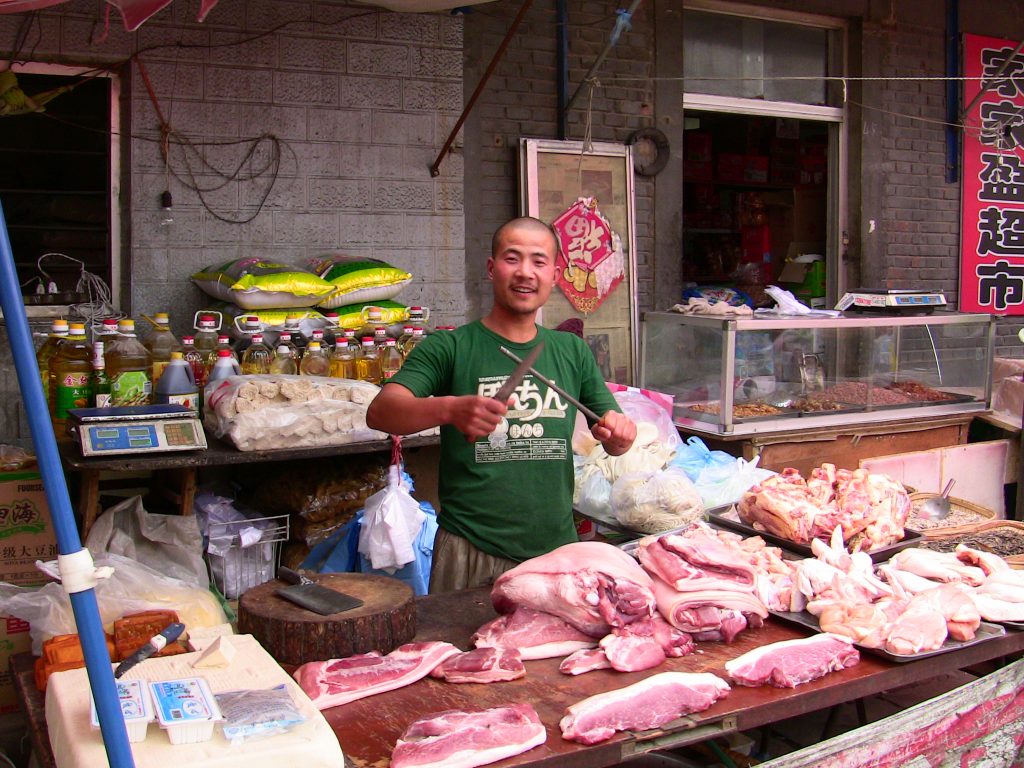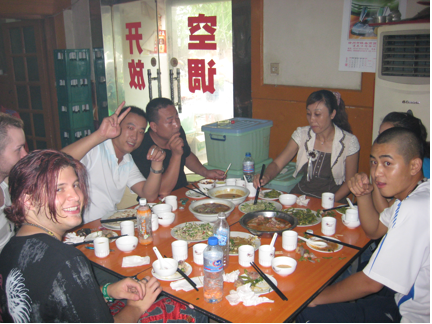The Power of Hello Posted by Stephen on Mar 8, 2010 in Uncategorized
Upon your first visit to China as a 老外 [lǎo wài] foreign guest , regardless of whether or not you speak the language, will almost always be an emphatic, yet English: HELLO!
From school children to cabbies, random strangers to tour guide members the greeting is awkwardly pronounced, but western specific. Sometimes it would border on the absurd, as in the case where a smiling street-cart (butcher, wielding his massive chop knives, yelled over to me “Hello, foreign meat.” (see caption). Other times, it would be simply out of curiosity, in areas where foreigners are less prevalent. But mostly, it is a common day fact of life, where a cacophony of street vendors 摊贩 [tān fàn] and daily market 市场 [shìchǎng] vendors assault your eardrums with a loud Hello followed by a naming of every conceivable product under the sun (a later post about street/night markets will follow shortly). However, even the gauntlet of “Hello’s” received from the street pales in comparison to the chorus of school children ecstatic that they now can practice their English greetings.
(A local street vendor, who got my attention by yelling in English: “Hello, American meat! After a few minutes of discussion about Kobe Bryant, we played a game of pool around the corner).
I soon began to realize that the presence and power of “Hello” was really telling of China and the Chinese people, namely indicating genuine curiosity and interest. While maybe tonally off and harshly phrased, it was always friendly and presented with a smile. After exchanging a few words in Chinese, almost ubiquitously, you’d hear a response of 你的汉语不错/你说中文说得很好,that is, your Chinese is not bad/you speak Chinese well, even if you only know a few introductory phrases. It’s not necessarily because you’re Chinese is good (or even that intelligible), but rather, they feel endeared to you because you are trying to speak their language. You are now building up 关系 [guānxì], that all important, system of networking which makes everything from friendships to business proposals possible, (also the topic of another blog).
Discovering this, I set out to just…well…talk. Every cabbie, person on the subway, street vendor that caught my eye, teacher, student, business man…you name it. I decided to play the smiling American, injecting my phrases of “what’s up friend” 怎么样朋友 [zěnmeyàngpéngyou ]. This phrase will undoubtedly draw attention and maybe even a few confused looks, but that’s a good thing, keep smiling and maybe shift to something tried and true like:
Basketball: 你喜欢大篮球吗?/你看不看美国篮球比赛? Do you like basketball?/ Do you watch American (NBA) basketball games. This is a good starter for guys because they absolutely love the NBA and love basketball and has never failed to illicit a conversation, and often leads to pick-up games.
Food: I’ve found that almost every person you talk to will know of an amazing place to eat within their neighborhood, even if it’s a hole in the wall, so ask away. 对不起,你可以帮我找到好吃的饭馆?/在你的看发,哪个饭馆有最好吃的反? “Excuse me, could you help me find a delicious restaurant?/In your opinion, which restaurant has the best food?” You may soon find that your new 朋友 wants to invite you (or even treat you) to a meal.
(Above, fellow 老外,Brian and Bob, enjoy a meal with Mr. Wang, seeing flashing the peace sign. After talking with Wang and his wife at a Carrefour, they graciously invited us to eat lunch with their family. After which, they signed us as English tutors.)
Now, this is an area where cultural differences can lead to miscommunication or hurt feelings. Usually, in the US, when a newly met stranger offers to treat you to a meal, you politely say “No, thanks” and quickly walk-away. In China, always say yes to an invitation to dinner, coffee, wedding, event, whatever, even if you barely know the person. The fact that they invited you means that they trust you, want to learn English or more about Western Culture, and will often use this simple interaction as the basis for a friendship. It’s cavalier and a little uncomfortable first, but you have to play by the cultural norms and 体验中国生活 [tǐ yàn, Zhōng guó shēng huó] he “experience Chinese life firsthand”.
For such a simple phrase, the power of Hello accomplishes so much when living, studying and working in China. It is your secret password or 密码 [mì mǎ] that gains you access into the Chinese community. It’s is that all important first step toward understanding the mindset and mentality of Chinese culture and language.

Build vocabulary, practice pronunciation, and more with Transparent Language Online. Available anytime, anywhere, on any device.
About the Author: Stephen
Writer and blogger for all things China related. Follow me on twitter: @seeitbelieveit -- My Background: Fluent Mandarin speaker with 3+ years working, living, studying and teaching throughout the mainland. Student of Kung Fu and avid photographer and documentarian.






Leave a comment: